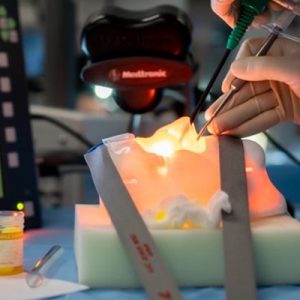 Robotic surgery, bionic limbs and 3D printed organs; as we hurtle into the next decade, the lines between engineering and medical science are blurring.
Robotic surgery, bionic limbs and 3D printed organs; as we hurtle into the next decade, the lines between engineering and medical science are blurring.
Utilising PhD-level research skills, Adelaide-based startup, Fusetec, is leading the pack and revolutionising healthcare by printing Australia’s first 3D simulations of human body parts.
Aiming to develop prototypes of the human thorax for medical training, Fusetec welcomed the expertise of RMIT PhD student Jiawei Ma through an internship facilitated by APR.Intern and supported by the Innovative Manufacturing CRC (IMCRC). In his final year of candidature, Jiawei’s academic background in biomedical engineering made him the perfect match for Fusetec’s life-saving research.
Mentored by RMIT School of Engineering’s Professor Jiyuan Tu, Jiawei was able to master new software that enhanced his digital reconstruction skills. He generated four realistic segmented thoracic models including rib cage, organs and tissue, of which the heart was 3D printed.
“Working with state-of-the-art industry software was an invaluable opportunity to see the application of my studies first-hand. The internship was also a great environment to develop soft skills such as teamwork, presentation and communication skills,”
Jiawei Ma, former PhD Intern now Anatomical Engineer at Fusetec
“Jiawei improved methods for achieving high-fidelity 3D models. This will allow team members to replicate his approach and cut-down timeframes on other projects,”
Dr Jacob Ross PhD MD, Anatomical Specialist at Fusetec and Jiawei’s Industry Supervisor
Following the internship’s success, Jiawei was employed by Fusetec in a newly created role, empowering him to continue solving real-life medical industry challenges.
This internship was supported by the Australian Government Department of Education, Skills and Employment and the Innovative Manufacturing CRC (IMCRC). IMCRC provides financial aid to Australian manufacturers looking to develop advanced manufacturing solutions.


